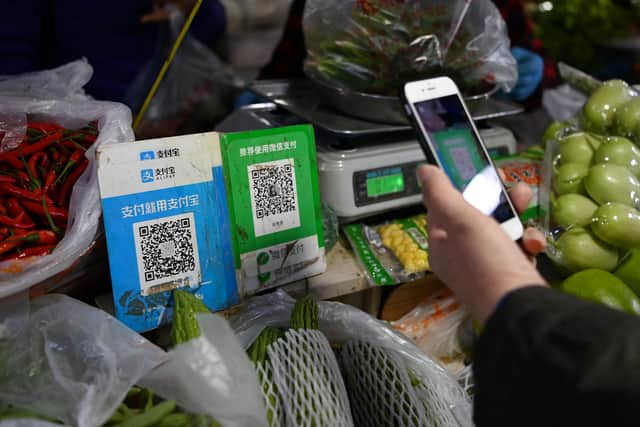WeChat: the Chinese 'Super App' that's inspiring Elon Musk's new vision for TwitterX
People in this article
and live on Freeview channel 276
Elon Musk’s continued “evolution” of Twitter took another turn at the start of the week, with the billionaire removing the beloved avatar of Larry, the blue bird long associated with Twitter, and replacing it instead with a letter that he’s fawned over previously - X. The move, which should now have affected dashboards of Twitter users around the world, is part of a large move to create an “everything app,” with “X” being the fundamental theme of this new venture.
Musk tweeted that the idea of changing the logo to "X" is "To embody the imperfections in us all that make us unique. And soon we shall bid adieu to the Twitter brand and, gradually, all the birds.”
Advertisement
Hide AdAdvertisement
Hide AdMusk has made overtures that Twitter will become part of an all-encompassing framework of apps, akin to Google’s Workspaces, where one app will branch out to different parts of the framework to make life “easier” - for example, using one app to pay for items, even if one person doesn’t have a card machine. Instead, using NFT technology like Google Wallet, a person can chat, pay and then arrange delivery of the item all with one app rather than scrolling across a myriad of unused apps on a phone.
Musk’s apparent inspiration for this new “everything app” is that of the Chinese communications app WeChat, which provides its users with a one-stop location to chat, pay for items, share news and use it as both a form of social media and a means of making chores like shopping and so forth easier with its versatility.
WeChat had more than 1.2 billion monthly active users by the end of 2021, making it one of the most popular social media and messaging apps globally. It is particularly dominant in China, where it has a large user base and is widely used for everyday communication, social networking, and mobile payments. In contrast, Twitter’s audience at its peak was 206 million daily active users, suggesting perhaps that Elon Musk is also looking at the Chinese marketplace than just looking out for the general public.
What is WeChat?


WeChat are a multi-purpose social media and messaging app developed by Tencent, a Chinese tech company and launched in January 2011; it has since become one of the most popular and widely used apps in China, with a growing user base outside the country as well.
Advertisement
Hide AdAdvertisement
Hide AdUsers can send text messages, voice messages, images, videos, and stickers to individuals or groups, facilitating seamless communication. Similar to a social media feed, users can share updates, photos, and videos with their friends through the "Moments" feature, allowing for interactive engagement with likes and comments.
For business and organizations, they can create "Official Accounts" on WeChat to interact with users, share content, and provide customer service, making it a valuable platform for brand engagement and customer relations. Additionally, the app supports "Mini Programs," allowing third-party developers to create mini-applications that run within WeChat, offering various services, games, and utilities.
WeChat also includes "WeChat Pay," enabling users to make mobile payments, transfer money to friends, pay bills, and make online purchases effortlessly. Furthermore, users can make free video and voice calls to their WeChat contacts, fostering real-time connections and communication. Lastly, the app offers a "Location Sharing" feature, allowing users to share their real-time location with friends and family for added convenience and safety.
It is the final few elements of the app that has caught the attention of Elon Musk, who wishes to create a similar “one-stop” app for the Western market.
Advertisement
Hide AdAdvertisement
Hide AdWho owns WeChat?
WeChat is owned by Tencent Holdings Limited, a Chinese multinational conglomerate; Tencent is one of the largest technology companies in the world and is headquartered in Shenzhen, China.
The company was founded in 1998 by Ma Huateng, also known as "Pony Ma," and Zhang Zhidong, and it has since grown into a major player in various industries, including social media, gaming, entertainment, e-commerce, and cloud services.
Is WeChat safe?
WeChat has faced some safety concerns and criticisms, primarily related to data privacy and censorship; as a Chinese app, WeChat is subject to Chinese laws and regulations, which include strict internet censorship.
It has been reported that WeChat's messages are monitored and filtered for sensitive content by the Chinese authorities. Additionally, concerns have been raised about the app's data collection practices and potential sharing of user data with the Chinese government.
Advertisement
Hide AdAdvertisement
Hide AdFor users outside of China, WeChat's data privacy policies have also raised concerns, as the app's terms of service grant Tencent broad rights to access and share user data. As a result, some countries and organizations have expressed caution about using WeChat, especially for sensitive communications or business purposes.
Are there any other apps similar to WeChat before Elon Musk creates his own version?
Not as of writing; though there are apps that have the features that WeChat provides, such as Google Wallet and Meta Threads, they still are not encompassed by one overarching app with users instead having to swap around from app to app.
Musk’s plans look to eventually eliminate the need to change what app is used for banking or for making social media posts and instead use “X” as the gateway for users to access these day-to-day activities rather than navigating through their phones.
Comment Guidelines
National World encourages reader discussion on our stories. User feedback, insights and back-and-forth exchanges add a rich layer of context to reporting. Please review our Community Guidelines before commenting.
